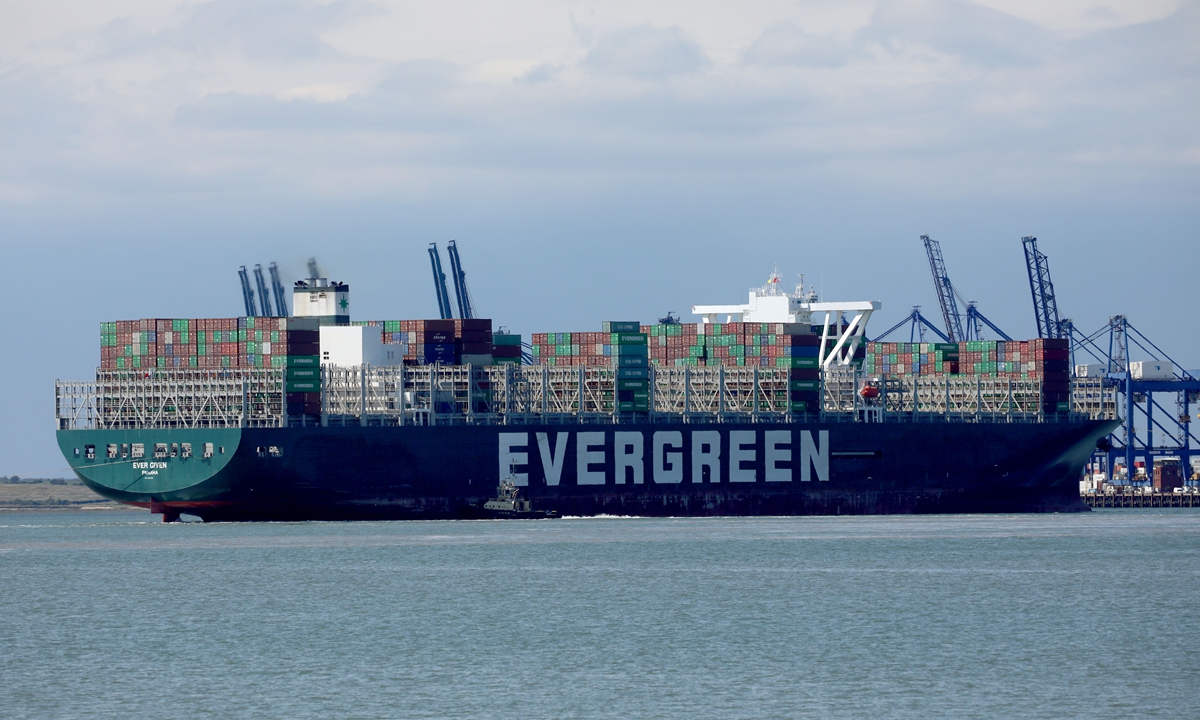Chinese traders try to avert disruption of shipments amid strike at UK port

The container ship Ever Given arrives at Felixstowe port on August 3, 2021 in England. The container ship had become lodged in the canal in March, requiring a six-day salvage operation to free the vessel. File Photo: VCG
Chinese traders are aiming to ensure that consumer goods like yoga mats can be delivered to UK clients despite disruptions from an eight-day strike of around 2,000 workers at the Port of Felixstowe, UK's largest container port.
The strike, starting Sunday and ignited by inflation and other factors, is raising uncertainty about shipments, and it may drive up freight rates and impede traders, industry insiders said, with cross-continental logistics systems already troubled by port congestion.
Industry analysts said the situation is manageable, since the duration of the strike is already known and China-UK bilateral trade is resilient.
Workers at the Port of Felixstowe have gone on strike for the first time since 1989, British media outlets reported over the weekend, with shipping companies and union leaders warning the move could cause supply chain disruptions while keeping shoppers waiting for goods.
Data from shipping big data company Elane sent to the Global Times showed that the status of congestion in the Port of Felixstowe on Monday morning was more than 30 hours, with only a handful of ships at anchorage.
As the UK's largest and busiest container port, the facility handles nearly half of UK's container throughput, and it's a vital link between the UK and Asia economies, including China, its third-largest trading partner.
Shipping companies and traders will have to reschedule shipments, industry sources said, which means extra costs for traders and more burdens to the UK economy, which is already suffering from inflation.
Guizhou Fuding Rubber Product Factory, a Guizhou-based producer and exporter of rubber-related products such as yoga mats to markets including UK, regularly uses the Port of Felixstowe.
An employee of the company, Brent Xu, told the Global Times that the changing situation has been noticed and clients are being contacted by email as goods arrive.
"For undelivered goods, our clients will pay in advance, and we will keep the goods in stock and wait for further notice," Xu said.
The world's No.2 container carrier Maersk said on August 18 that it expected the strike to "have significant impact to the vessel line up and are actively working along with vessel partners to mitigate risk and disruption as much as possible." Reefer bookings are particularly affected.
The strike's impact on China-UK supply chain can be foreseen, given the magnitude of the port in bilateral trade, Zhong Zhechao, founder of One Shipping, an international logistics service consulting company, told the Global Times on Monday.
In 2021, UK imported 63.6 billion pounds ($75.08 billion) worth of goods from China, which accounted for 13.3 percent of all goods imported, making China UK's largest import source, UK government data showed.
Major goods such as machinery, transport equipment, exercise equipment and toys could be affected if the strike continues.
"Some shipping companies may have to divert to neighboring ports, which means rescheduling shipments," Zhong said. The situation could worsen if other ports face similar delays.
More than 500 dockworkers at the Port of Liverpool, one of Britain's largest container ports, have voted in favor of strike action over pay, Reuters reported on August 16.
Despite the disruptions, industry insiders said there will be no substantial impact on China-UK trade, which has proved resilient in hard times amid the pandemic.
Zheng Jingwen, a research fellow at the Shanghai International Shipping Research Center, told the Global Times on Monday that port strikes have become frequent not only in UK but also in other parts of Europe, caused by inflation.
"The strike duration at the port this time is relatively short, so congestion can be managed and the impact will be controllable," Zheng said. Also, other ports, such as the Port of London, can process more goods.



